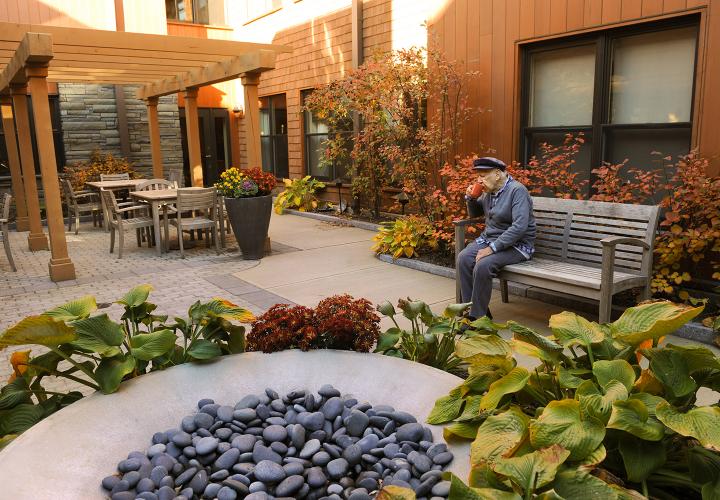High-Quality Care Plans Offered With Alzheimers Care Charlotte Centers
High-Quality Care Plans Offered With Alzheimers Care Charlotte Centers
Blog Article
Developing a Safe and Helpful Atmosphere for Alzheimer's Care
The production of a helpful and secure atmosphere for individuals with Alzheimer's is paramount in boosting their top quality of life. This entails not only physical adjustments within the home, such as lessening hazards and including familiar elements, yet also the implementation of organized routines and purposeful activities that cater to their cognitive needs. Moreover, understanding the mental and emotional dimensions of treatment can considerably impact their complacency and connection. Checking out these complex approaches can disclose critical insights into reliable caregiving strategies that may change the everyday experiences of both caregivers and clients.
Recognizing Alzheimer's Needs
Regularly, individuals with Alzheimer's illness show a variety of requirements that need customized techniques to care. As the condition progresses, cognitive decline shows up in different means, influencing memory, reasoning, and even the capacity to carry out day-to-day activities. Caregivers must identify these developing needs to give suitable support and make certain a better of life for those influenced.
One critical element of comprehending Alzheimer's requirements is recognizing the value of routine and familiarity. People commonly find convenience in established patterns, which can decrease stress and anxiety and confusion. Caregivers ought to make every effort to create organized day-to-day routines that include meaningful tasks lined up with the person's rate of interests and capabilities.
In addition, efficient communication is vital. Individuals with Alzheimer's may struggle to express themselves or comprehend intricate language. Caretakers should utilize basic, clear language, use non-verbal signs, and practice active paying attention to promote understanding and connection.
Lastly, emotional and social requirements can not be ignored. Giving opportunities for social communication and preserving relationships can considerably improve psychological health. Caregivers ought to encourage interaction in community activities or household celebrations, promoting a feeling of belonging and function. Recognizing these varied needs is vital for creating a supportive treatment atmosphere.
Creating a Safe Home
Creating a risk-free home for people with Alzheimer's illness is necessary to lessening dangers and advertising freedom. The design of the home should prioritize safety and security while enabling personal convenience. Get rid of potential risks such as loosened carpets, sharp items, and clutter, which can lead to drops or accidents. Make sure that pathways are clear and well-lit, as proper illumination minimizes disorientation and boosts wheelchair.
Integrating adaptive attributes is likewise crucial. Mount grab bars in bathrooms and near stairways, and think about making use of non-slip mats in wet locations. Furthermore, utilizing contrasting shades for floors and walls can help in differentiating spaces, assisting to mitigate confusion.
Familiarity is necessary for individuals with Alzheimer's. Individualizing the environment with acquainted items and pictures can enhance a feeling of belonging and security - Alzheimers Care Charlotte. It is also valuable to have actually a marked area for day-to-day tasks, such as reading or crafting, which can supply framework to their day
Lastly, executing a secure outside room permits risk-free expedition while getting in touch with nature. By attentively making the home environment, caregivers can considerably enhance the top quality of life for people coping with Alzheimer's disease.
Enhancing Interaction Abilities

Non-verbal communication, consisting of faces, motions, and touch, plays a crucial duty in communicating compassion and understanding. Preserving eye contact and a calm attitude can improve the convenience level of the individual, advertising a feeling of safety.
In addition, it is essential to exercise active listening. This includes being fully present, revealing patience, and allowing the individual to share themselves without interruption. Repetition may be necessary; caregivers ought to be prepared to review questions or subjects, as individuals with Alzheimer's might struggle with memory recall.
In addition, using visual aids or cues, such as photos or familiar things, can help with acknowledgment and engagement. Inevitably, improving interaction abilities is about building count on and producing an atmosphere where people feel heard, valued, and comprehended, therefore enriching their lifestyle.
Urging Social Interaction
Promoting significant social interactions can greatly enhance the well-being of people with Alzheimer's illness. Engaging with others not only assists combat feelings of seclusion however also my site boosts cognitive function and emotional wellness. Structured social activities, such as group games, crafts and arts, or songs therapy, produce possibilities for citizens to get in touch with peers and caretakers, which can lead to improved mood and minimized stress and anxiety.
Producing a welcoming environment that urges socializing is important. This can be achieved by arranging common rooms that facilitate communication, such as comfy seating locations or activity rooms. Additionally, incorporating familiar and culturally relevant tasks can motivate and stimulate memories participation, enabling people with Alzheimer's to feel more linked to their previous experiences.
Additionally, caretakers must be trained to identify and promote social engagement among residents. By prioritizing social communication, we can considerably improve the lives of those living with Alzheimer's, fostering a sense of area and belonging.
Sustaining Caregiver Health

To sustain caretakers, companies need to use routine training and academic sources to boost their understanding of Alzheimer's condition and caregiving techniques. Offering accessibility to break treatment solutions allows caregivers to take necessary breaks, minimizing stress and tiredness - Alzheimers Care Charlotte. Furthermore, promoting a community through support system can facilitate psychological sharing and the exchange of practical recommendations amongst caretakers, creating a network of mutual support
Mental health resources, such as therapy services, can additionally be important in resolving the psychological toll caregiving can take. By prioritizing caretaker health, we develop an even more sustainable caregiving setting that not only benefits the caregivers themselves but additionally boosts the total high quality of treatment gotten by individuals with Alzheimer's. Inevitably, supporting caregivers is an important component in fostering a effective and compassionate care setup.
Final Thought
Finally, the production of a risk-free and supportive setting for individuals with Alzheimer's is vital to boosting their lifestyle. By focusing on safety and security with thoughtful layout, fostering emotional wellness with familiar components, and promoting interaction with structured regimens, caretakers can dramatically affect the general experience of those affected by this problem. Sustaining caretaker wellness is critical, as it inevitably adds to an extra compassionate and reliable care setting.
Repetition may be needed; caretakers ought to be prepared to take another look at inquiries or subjects, as individuals with Alzheimer's may have a hard time with memory recall.
Report this page